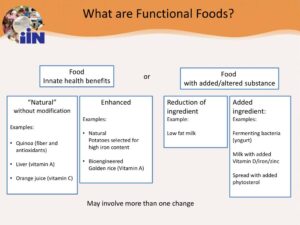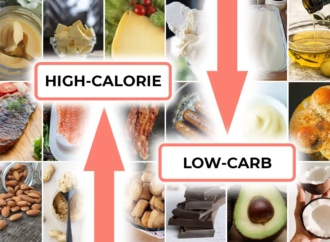Many people today face health problems caused by poor diet, stress, and lack of physical activity. Common issues like obesity, heart disease, and digestive disorders are on the rise. To fight these problems, we need more than just basic nutrition—we need foods that support overall health. Functional foods offer a simple, natural solution. These are everyday foods that provide extra health benefits beyond energy and nutrients. They may help prevent illness, boost immunity, and improve how our bodies work. By including functional foods in our diets, we can take small but powerful steps toward a healthier and longer life.
What Are Functional Foods?
Functional foods are foods that not only feed the body but also improve health. They contain natural or added ingredients that provide health benefits. These benefits may include better digestion, stronger immunity, improved heart health, and protection from chronic diseases like diabetes or cancer. For example, oats contain beta-glucan, a type of fibre that helps lower cholesterol. Yoghurt with probiotics supports gut health. Fortified foods like orange juice with vitamin D help strengthen bones. These foods go beyond basic nutrition by helping the body function at its best.
Types of Functional Foods

There are two main types of functional foods: Both types support better health and can be added easily to everyday meals.
- Naturally functional foods – These foods have health-promoting ingredients already present.
- Example: Berries contain antioxidants that protect cells from damage.
- Example: Fatty fish like salmon contain omega-3 fatty acids for heart health.
- Fortified or enriched foods – These are foods with added nutrients.
- Example: Milk with added vitamin D and calcium.
- Example: Cereals enriched with iron, B vitamins, or fibre.
Benefits of Functional Foods
Functional foods can offer several health benefits. These foods help prevent common health problems and promote long-term wellness.
- Digestive health: Probiotic-rich foods like yoghurt and kefir support gut bacteria and ease digestion.
- Immune support: Citrus fruits, garlic, and foods rich in vitamins C and E help fight illness.
- Heart health: Oats, flaxseeds, and fatty fish help reduce bad cholesterol and inflammation.
- Bone strength: Calcium and vitamin D in dairy and fortified drinks build strong bones.
- Weight control: Whole grains and high-fibre foods help with fullness and reduce overeating.
Examples of Common Functional Foods
Here are some popular functional foods and their benefits. These foods are widely available and can be part of a balanced diet.
- Oats: Rich in fibre; lowers cholesterol.
- Salmon: Contains omega-3s for heart and brain health.
- Berries: Packed with antioxidants that protect cells.
- Nuts and seeds: Provide healthy fats and protein.
- Yoghurt with probiotics: Supports gut health.
- Fortified orange juice: Offers added calcium and vitamin D.
- Green Tea: It contains compounds that protect the brain and reduce inflammation.
Functional Foods vs. Health Supplements
Functional foods are different from health supplements. Functional foods are part of regular meals and offer a range of nutrients naturally or through fortification. Supplements, on the other hand, are pills, powders, or liquids that provide specific nutrients in concentrated form.
Supplements are useful if someone has a deficiency, but they can’t replace the benefits of whole foods. Functional foods provide a mix of fibre, vitamins, and other compounds that work together to support health. It’s usually best to get nutrients from food first and use supplements only when needed.
How to Add Functional Foods to Your Diet
Adding functional foods to your diet is easy. Small changes can lead to big improvements in your health over time.Here are some practical tips:
- Start your day with oatmeal and berries.
- Snack on probiotic yoghurt or nuts.
- Drink green tea instead of sugary beverages.
- Add leafy greens like spinach to your meals.
- Choose whole grain bread and brown rice.
- Use fortified milk if you don’t drink dairy.
Conclusion: A Healthier Future Through Smart Eating
Today, many people suffer from preventable health problems like heart disease, obesity, and poor digestion. A major cause is unhealthy eating habits and diets low in nutrients. The solution lies in making better food choices—specifically, including functional foods in everyday meals. These foods offer more than basic nutrition. They protect the heart, boost immunity, support digestion, and improve overall well-being. Rather than relying on pills or quick fixes, people can turn to nature’s own medicine—food. By choosing whole, functional foods regularly, we can take control of our health simply and naturally. The path to better health starts on your plate.
 Food Manifest
Food Manifest 


















